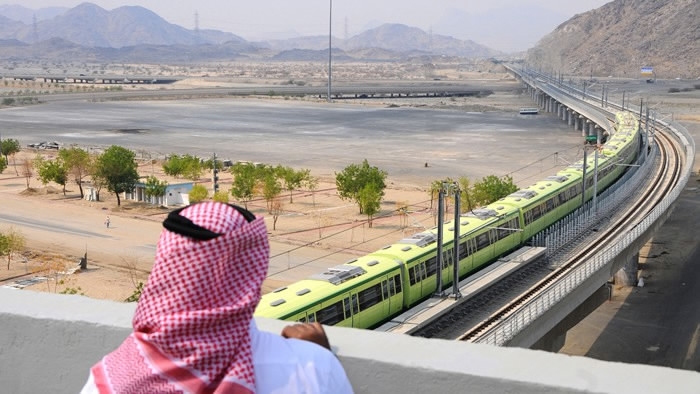Relations between China and Saudi Arabia have entered a fast lane of full development, Chinese Vice Premier Zhang Gaoli said last week ahead of his Middle East tour.
Zhang is set to chair the second meeting of a China-Saudi Arabia high-level steering committee for coordinating bilateral cooperation in Riyadh after visiting Kuwait on Tuesday.
Since the establishment of a comprehensive strategic partnership in 2016, China and Saudi Arabia have been witnessing closer ties and deepening cooperation, as the two countries strive to coordinate their development strategies – the Belt and Road Initiative and Saudi Vision 2030.
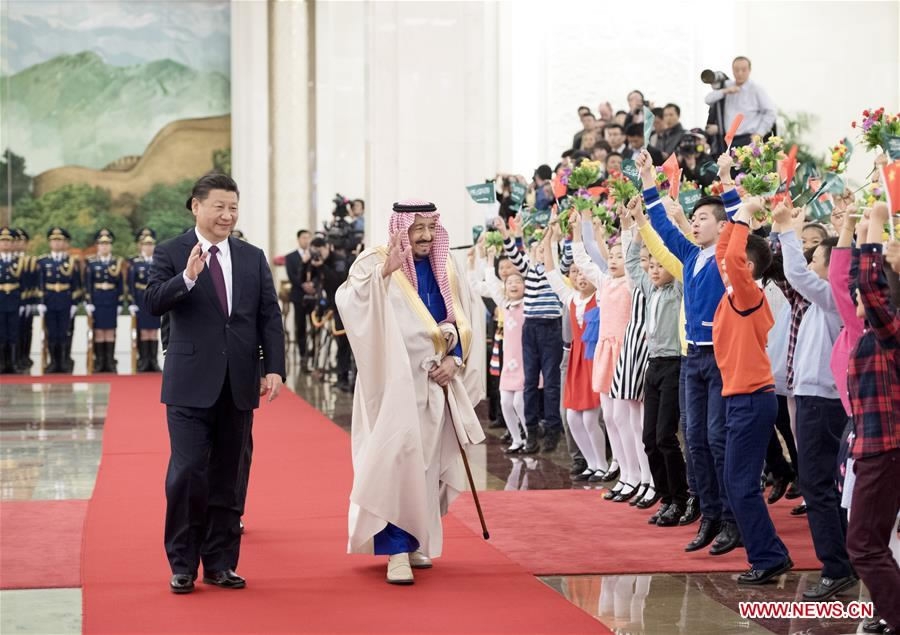
Chinese President Xi Jinping (L) holds a welcome ceremony for Saudi King Salman bin Abdulaziz Al Saud in Beijing, China, March 16, 2017. /Xinhua Photo
Chinese President Xi Jinping (L) holds a welcome ceremony for Saudi King Salman bin Abdulaziz Al Saud in Beijing, China, March 16, 2017. /Xinhua Photo
Some analysts have indicated that Beijing is boosting its presence in the region while Washington's influence wanes.
Strategic partners
Although Saudi Arabia was the last Arab country to establish diplomatic relations with China (in 1990), the two have become important business and strategic partners.
The West Asian country has been China's top crude oil supplier for many years straight. Meanwhile, the latter is Saudi Arabia's biggest business partner, with bilateral trade reaching 42.36 billion US dollars in 2016, according to Chinese official figures.
Over recent years, the accelerated development of their ties has been exemplified by frequent mutual visits by national leaders and expanding cooperation in various fields.
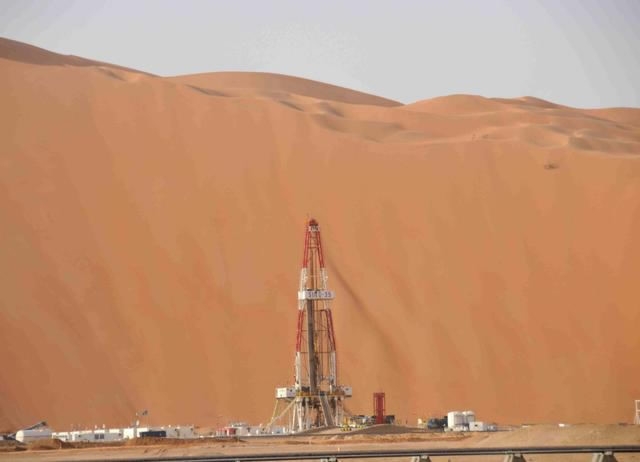
An oil platform of China's Sinopec (Zhongyuan) in eastern Saudi Arabia. /Xinhua Photo
An oil platform of China's Sinopec (Zhongyuan) in eastern Saudi Arabia. /Xinhua Photo
In January 2016, Chinese President Xi Jinping visited Saudi Arabia, becoming the first Chinese head of state to pay a state visit to the kingdom in seven years. During the landmark visit, the two countries agreed to lift their bilateral ties to a comprehensive strategic partnership and jointly pursue the Belt and Road Initiative.
In August 2016, the first meeting of the China-Saudi Arabia high-level steering committee for coordinating bilateral cooperation was held in Beijing. Vice Premier Zhang said China is ready to synergize the Belt and Road Initiative and Saudi Arabia's Economic Vision 2030.
The two countries signed 17 cooperative agreements, covering politics, energy, finance, investment, housing, water resources, quality inspection, science, technology and culture.
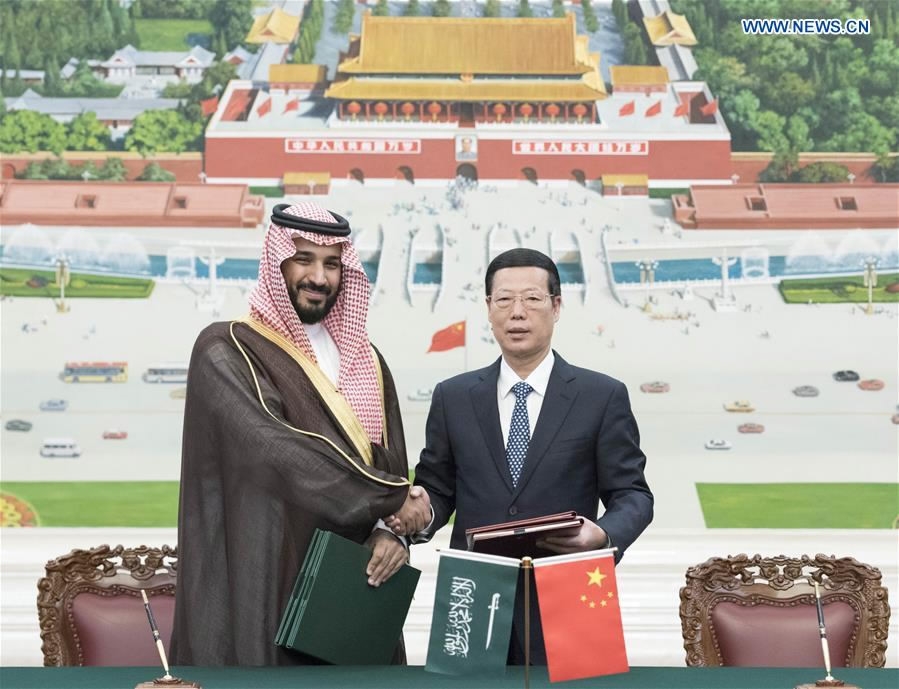
Chinese Vice Premier Zhang Gaoli (R) and Saudi Arabia's then-Deputy Crown Prince Mohammed bin Salman sign 17 cooperative agreements in Beijing, China, August 30, 2016. /Xinhua Photo
Chinese Vice Premier Zhang Gaoli (R) and Saudi Arabia's then-Deputy Crown Prince Mohammed bin Salman sign 17 cooperative agreements in Beijing, China, August 30, 2016. /Xinhua Photo
Saudi King Salman bin Abdulaziz Al Saud visited China in March, leading a huge delegation. The visit saw the signing of a memorandum of understanding on production capacity and investment cooperation, involving 35 projects that are worth a total of 65 billion US dollars.
China supports Saudi Arabia in its Saudi Vision 2030 plan, and welcomes the country to be a partner in the Belt and Road Initiative, Xi told the Saudi king.
Belt and Road Initiative and Saudi Vision 2030
The most frequently mentioned phrases in recent meetings between China and Saudi leaders are the "Belt and Road Initiative" and "Saudi Vision 2030." The two countries, complementary with each other, are exploring ways to promote the docking of their growth strategies.
Proposed by Xi in 2013, the Belt and Road Initiative refers to the Silk Road Economic Belt and the 21st-Century Maritime Silk Road. Saudi Arabia, a major country situated at the junction of Asia, Europe and Africa and close to the Gulf, the Red Sea and the Indian Ocean, has the potential to play significant roles along both routes.

Chinese President Xi Jinping (L) is awarded with Abdulaziz Medal by Saudi King Salman bin Abdulaziz Al Saud in Riyadh, Saudi Arabia, January 19, 2016. /Xinhua Photo
Chinese President Xi Jinping (L) is awarded with Abdulaziz Medal by Saudi King Salman bin Abdulaziz Al Saud in Riyadh, Saudi Arabia, January 19, 2016. /Xinhua Photo
More than 140 Chinese enterprises have begun tapping Saudi Arabia's markets, including in the energy, housing, construction and telecommunication industries, Chinese Ambassador to Saudi Arabia Li Huaxin told Xinhua recently.
Li said a "1+2+3" model has taken shape for the two countries' industrial cooperation. The model refers to the energy industry as the core of business ties, with two supporting industries, namely infrastructure, and trade and investment, and three emerging, cutting-edge trade areas, mainly nuclear power, aerospace and renewable energy.
Saudi Arabia has emerged as an important player along Belt and Road routes, the ambassador added.
On the other hand, Saudi Arabia, whose economy is hugely dependent on oil exports, announced the Saudi Vision 2030 plan in April last year, in an effort to diversify its industrial structure amid falling oil prices.
According to Saudi Vision 2030, the country aims at becoming "the heart of the Arab and Islamic worlds, the investment powerhouse, and the hub connecting three continents."

The Chinese-built Holy Sites metro light rail in the western Saudi city of Mecca. /AFP Photo
The Chinese-built Holy Sites metro light rail in the western Saudi city of Mecca. /AFP Photo
To implement the ambitious strategy, Saudi Arabia "urgently needs to pursue broad and deep cooperation with China, a big country that contributes over one third of the output of the global equipment manufacturing industry," renowned Chinese economist Mei Xinyu wrote in a commentary earlier this year.
'Honest broker'
While the US has been Saudi Arabia's most important strategic partner since the end of World War II, China's influence in the region is growing quickly.
After the September 11 attacks, US-Saudi Arabia relations experienced ups and downs and situations in the Middle East became increasingly volatile. Therefore, Riyadh finds it necessary to strengthen ties with East Asian countries, Mei said.
A Beijing-based diplomat from a Muslim-majority country told Reuters that China was trying to play the role of an "honest broker" in the Middle East. "China does not take sides and that is appreciated," the diplomat said on condition of anonymity.
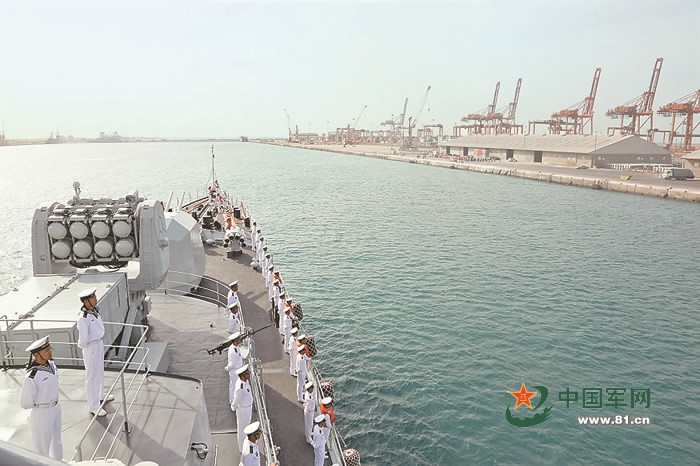
A Chinese naval fleet arrives at the Port of Jeddah for a five-day friendly visit to Saudi Arabia, January 9, 2016. /Photo via Chinese Defense Ministry
A Chinese naval fleet arrives at the Port of Jeddah for a five-day friendly visit to Saudi Arabia, January 9, 2016. /Photo via Chinese Defense Ministry
Commenting on the growing closeness between China and Saudi Arabia in January, Yoel Guzansky and Assaf Orion, researchers at Israel-based Institute for National Security Studies (INSS), said "both countries are finding a common comfort zone in mutual respect of their sovereignties."
For Saudi Arabia, China is a "stable and reliable" strategic partner that complements its traditional partnership with the US, "without the unpleasant Western criticism on issues relating to human rights and democratization," the article noted.
By enhancing ties with China, Saudi Arabia "is trying to hedge its bets in a multi-polar world," Wang Jin, a part-time research fellow at the Middle East Center of China's Xiamen University, wrote in a commentary for The Diplomat last September.
In addition, many analysts said the two countries are working closely to address the threat of terrorism.

